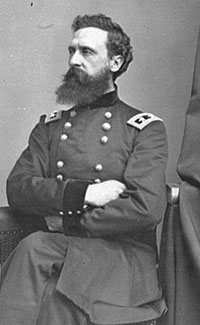
George Sykes (1822-1880)
George Sykes (October 9, 1822 - February 8, 1880) was a career U.S. Army officer and a Union general during the American Civil War.
Sykes was born in Dover, Delaware. He graduated from the U.S. Military Academy in 1842 and was commissioned a second lieutenant in the 3rd U.S. Infantry regiment. He served in the Mexican War and Seminole War and was brevetted as a captain for actions at Cerro Gordo in Mexico. 
At the outbreak of the Civil War, Sykes was assigned as a major in the 14th U.S. Infantry. At the First Battle of Bull Run, he commanded the Regular Infantry Battalion, a collection of eight Regular Army companies from different regiments, the only regulars on the field. He continued his association with regulars in the early defensive positions around Washington, D.C. and then as a division commander of regulars in the Peninsula Campaign, the 2nd Division of the V Corps.
Sykes continued as a division commander through the battles of Second Bull Run, Antietam (in reserve), Fredericksburg, and Chancellorsville (in reserve). He was promoted to major general after Antietam, on November 29, 1862. None of these battles demonstrated any aggressive or unique capabilities on his part. He was known to his colleagues by the nicknames "Tardy George" and "Slow Trot" Sykes. When corps commander George G. Meade was promoted to lead the Army of the Potomac on June 28, 1863, Sykes assumed command of the V Corps.
At the Battle of Gettysburg, his corps fought in support of the beleaguered III Corps on the Union left flank. In his 1st Division (James Barnes), the fabled defense of Little Round Top was led by brigade commander Strong Vincent and the 20th Maine Infantry under Joshua Lawrence Chamberlain. His 3rd Division, the "Pennsylvania Reserves", led by Samuel W. Crawford, attacked from Little Round Top, drove the Confederates across the "Valley of Death" and ended the deadly fighting in the Wheatfield. But there is little in the historical record that highlights any personal contribution made by Sykes.
In the Mine Run Campaign in the fall of 1863, Meade complained of Sykes' lackluster performance (although this was frankly an example of the pot calling the kettle black). Meade and general-in-chief Ulysses S. Grant agreed that Sykes was not a good choice for the upcoming Overland Campaign in May, 1864, so when the Army of the Potomac was reorganized that spring, Sykes lost his corps and was sent to uneventful duty in the Department of Kansas.
Sykes finished his unremarkable career as a colonel in the U.S. Army. He died in Fort Brown, Texas and is buried in West Point National Cemetery.